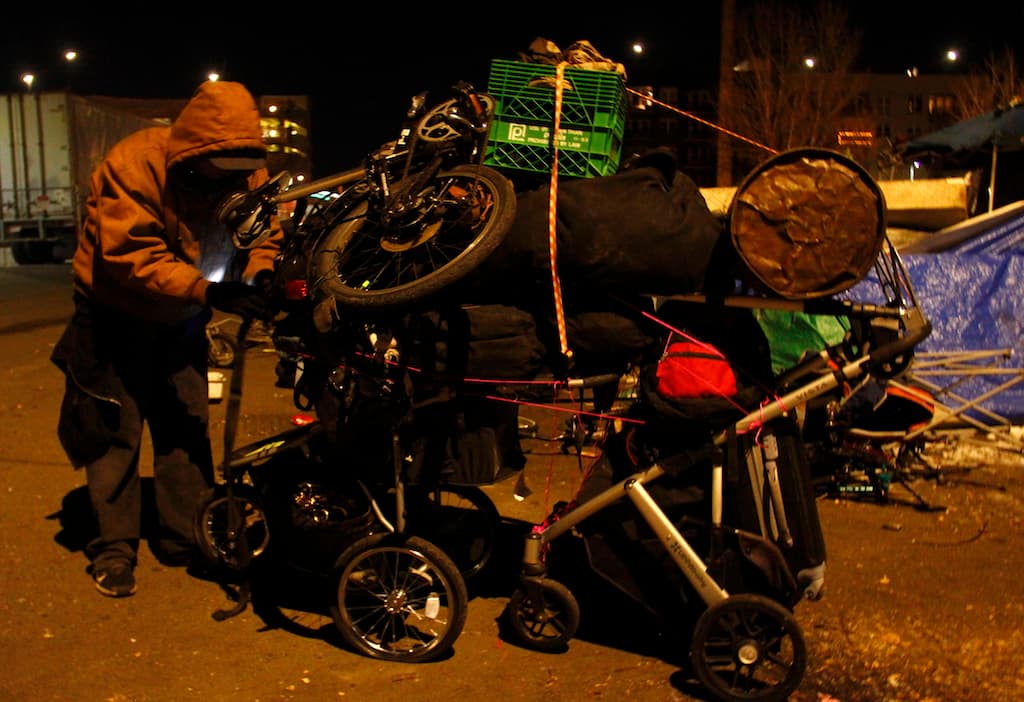Denver has argued this year that conditions at homeless encampments deteriorated to dangerous levels during the pandemic, forcing the city to conduct cleanups that people experiencing homelessness say have violated their constitutional rights and threatened their health.
A federal judge who is weighing those positions started hearing evidence Tuesday in a case filed by the advocacy group Denver Homeless Out Loud and people experiencing homelessness who want Denver to stop clearing encampments. Andy McNulty, the lawyer representing the plaintiffs, opened the two-day hearing by telling U.S. District Court Judge William Martinez that Denver routinely destroys the property of people experiencing homelessness, which he said is a violation of their right to due process and other constitutional provisions. McNulty added that scattering people as COVID-19 has surged places "unhoused individuals in danger."
In her opening remarks, Assistant City Attorney Wendy Shea said that when the pandemic arrived, Denver initially left encampments in place. But conditions -- such as rat infestations and the accumulation of human waste and drug paraphernalia -- worsened. City health officials had "to act to protect public health and environment for all," she said.
Shea also said that notice has preceded cleanups, that people living in encampments are given a "reasonable" chance to pack up and move and that when tents, sleeping bags and other items are destroyed, it is because the owners have given city workers permission to do so or because the property has been determined to be contaminated in some way.
Both sides, starting with the plaintiffs on Tuesday followed by the city on Wednesday, are calling witnesses to make their cases. McNulty's witnesses on Tuesday included Steven Olsen, who was living in a tent along the South Platte where Denver meets Englewood in September. Olsen described going to look for work one morning, and returning at noon to find no sign of his home.
"It had been leveled," Olsen said.
Olsen said he had had no warning of the cleanup, and that he was never able to retrieve tents, sleeping bags, coolers, bicycles and other items from his camp.
"I went from being able to live to just having totally no luck at all," said Olsen, who remains homeless and is among the plaintiffs in the case.
Jacob Wessley is director of outreach and engagement for the Colorado Coalition for the Homeless. He testified about how the impact of camp clearances affect outreach workers' efforts to support people experiencing homelessness, offering as an example a diabetic woman who had been living in a large tent camp near the Crossroads shelter in Five Points.
Wessley said a nurse who was part of an outreach team had been trying to help the woman, who was struggling to manage her diabetes. Then came the clearance of the camp on Nov. 30.
"Since the camp's been swept, we haven't been able to locate" the woman with diabetes, Wessley said.
Marisa Westbrook, a public health researcher who is working on her doctorate at the University of Colorado Denver, testified Tuesday about guidance from the Centers for Disease Control and Prevention, which has cautioned that clearing encampments can increase the risk of spreading disease during the pandemic by dispersing people and disrupting their connections with service providers.
"There is a consensus that sweeps are not the solution" during the pandemic, Westbrook said.
The city argues that it is not alone across the nation in having to clear camps despite CDC guidance, citing the situation in places such as Portland, Ore., and Reno, Nev.
Kathleen Van Voorhis is the point person on housing and homelessness for the Interfaith Alliance, a nonprofit that has lobbied for the opening of Denver's first temporary sanctioned campsites. She testified Tuesday that the solution to the challenges posed by encampments included housing as well as more sanctioned campsites and the provision of regular trash pickups, bathrooms at other services at unsanctioned sites.
Sanctioned camps, also known as safe outdoor spaces, are places where people without homes do not have to worry about being moved along by city officials and have access to bathrooms, regular trash pickup and counseling. Denver's camps are to operate for just six months as a way to address homelessness during the pandemic. Other steps have included providing hotel rooms for people experiencing homelessness who are affected by COVID-19, opening new shelters and ensuring shelters are open around the clock.
During Tuesday's hearing, several witnesses described seeing cleanups firsthand, which city lawyers took as an opportunity during cross examination to ask them about the kinds of conditions they argue prompt the operations. During one exchange, Assistant Attorney Shea asked District 9 City Councilmember Candi CdeBaca whether she had seen feces at the camp near the Crossroads shelter in Five Points.
"I did not see feces. I saw a lot of trash," CdeBaca said, adding that that is what happens when the city fails to collect trash. CdeBaca has been a sharp critic of Mayor Michael Hancock's handling of homelessness.
The plaintiffs are suing Hancock, Gov. Jared Polis., police officers, state troopers and employees of Denver's health and public works departments and a private hazardous materials company that the city contracts to help with cleanups. Public works or health officials typically embark on cleanups.
Lawyers for Polis have asked the judge to withdraw the case against him, arguing that managing homeless encampments is a local responsibility, though acknowledging that state troopers took part in a July cleanup at state-owned Lincoln Memorial Park near the Capitol.
Judge Martinez scheduled this week's hearings to help him consider a request to issue an injunction that would end encampment clearances pending a later trial in the case. It is not clear when Martinez might rule on the request for an injunction.













